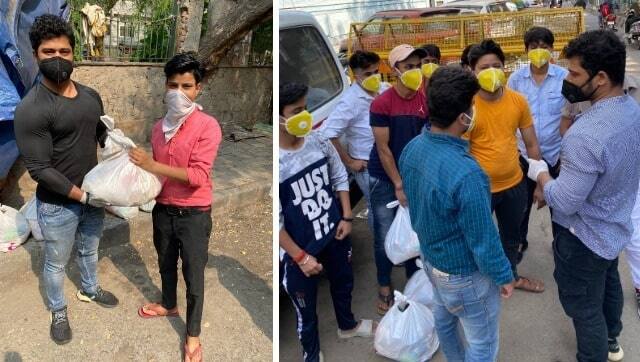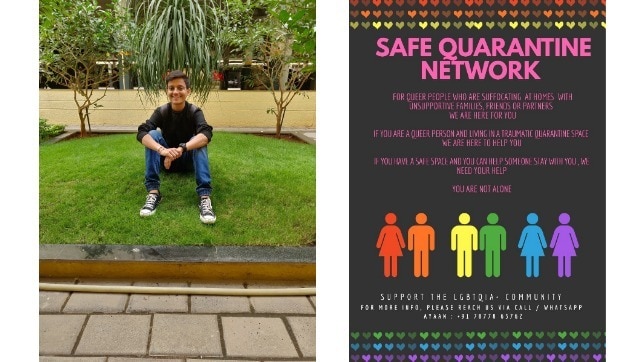When India went into Phase I of its lockdown to combat the coronavirus pandemic, with little to no preparation for millions of its most vulnerable citizens, 28-year-old Aryan Pasha took it upon himself to help as many as he could. Aryan — a lawyer who is also known as “India’s first trans man bodybuilder” — and his partner Laxmi Tripathi began delivering rations, testosterone injections and hand wash to over 250 transgender men in Delhi alone. The fact that they were reaching out to trans men raised a singular challenge: “For trans women, you can donate to an organisation or the dera where they live, but trans men don’t live [together] in one place,” Aryan points out. “Trans men do not have options like staying within a gharana system.” What this meant was that Aryan had to go door-to-door in his quest to provide support; on one occasion, he travelled 46 km to help a man in rural Bihar. He has also reached out to volunteers in urban and rural Telangana, Maharashtra, Gujarat, Bihar, Rajasthan, Jharkhand, Manipur and Orissa. India’s lockdown has imposed a heavy toll on the lives of transgender people. While some have had little recourse but to rely on donations from organisations and philanthropists, others have had to return home to unsupportive and abusive families, while living with increased gender dysphoria. As reported in Firstpost, the government of India had assured Rs 1,500 each as relief to 4.88 lakh transgender persons. But just like our conversations on inclusion and policies, this figure and the half-hearted assurances of the government fail to include transgender men. Emphasising that the issues of transgender men are different from those of the rest of the LGBTQ+ community, Anand Kumar, who returned to his village in Patna due to the lockdown, notes, “Nobody talks about the problems our community is facing right now. If there is anyone helping this community, it is the members of the community themselves.” Driven and determined by their own experiences to help other young transgender persons, it is members like Aryan Pasha, Lucky Neog and Ayaan, who are among the few providing essential supplies and constant online and offline support to others in the community over the past three months. *** [caption id=“attachment_8498761” align=“alignnone” width=“640”]  Aryan Pasha has been able to reach out to 250 trans men in Delhi alone[/caption] Ten years ago, Aryan was the first teenager in India to transition at the age of 18 with enthusiastic support from his family. Not everyone receives such support at home. As an eminent member of the community, Aryan feels he must reach out and help teenagers and young adults who have begun their gender affirmation process. “Teens who ran away from home to start their transition are now stuck. Trans men with graduate degrees are looking for work as manual labourers because they don’t have money for gas. Teenagers are vulnerable. Within the community as well people try to take advantage of others,” says Aryan, who is quick to answer youngsters’ queries on Instagram. Apart from financial problems and delays in delivering rations and hormone kits, Aryan faces “unnecessary questioning from within the community” itself. “Only a person on HRT (hormone replacement therapy) knows how much they need it. People who have missed their shots have been requesting me to help them. If a transitioning male does not get his hormone shots on time, his menstruation cycle can start again. Because of that, a person could be at very high risk for suicidal tendency, anxiety and depression.” *** There are broadly two types of testosterone shots of different dosages in India — Testoviron and Sustanon. However, the hormone shots, costing around Rs 300 each, are not available and accessible in all regions, especially during a lockdown. Men who are transitioning are prescribed to take regular amounts of testosterone every two or three weeks, depending on the brand and dosage. Before the coronavirus outbreak, many transgender persons visited their doctors or nurses to get their hormone shots, but now apprehensive about visiting hospitals and dispensaries, some have learnt to self-inject the shots at home. Twenty one-year-old Shivv, who is working from his home in Agra, watched many instructional videos on YouTube before taking a testosterone shot with the help of his girlfriend for the first time. Like him, many young transgender men are relying on DIY (do-it-yourself) videos on YouTube to continue their hormone replacement therapy at home. Lucky Neog, a filmmaker who works in Tezpur, Assam, is one such YouTube publisher who uploads experiential and informational videos on female-to-male (FTM) transitioning. Lucky, 25, began hormone replacement therapy two years ago, and having learnt to self-inject regularly, shares with his subscribers his experiences with availing testosterone shots in Assam. The testosterone shots prescribed to Lucky are not locally available in the state, so he purchases it online. [caption id=“attachment_8498781” align=“alignnone” width=“640”]  Lucky Neog’s YouTube channel[/caption] “When we went under lockdown, the delivery for hormone shots stopped. If I do not take it every two weeks, there is a chance of getting my period again. But so far, I have not experienced getting my period in between shots,” said Lucky. This lockdown is not the only time the state of Assam has completely shut down: Lucky has previously missed taking his testosterone shot during the Assam bandh when there were widespread protests in the state against the contentious and exclusionary Citizenship Amendment Act (CAA). Two days after the lockdown began, Lucky put up a video called ‘Akele mat saho, baat kar lo mujhse (You don’t have to face it alone, talk to me)’ for transgender community members and “anyone who is affected mentally because they are living with unsupportive families”. Since then, young people from different regions, including non-resident Indians from other countries, have called and messaged Lucky for advice on FTM transitioning, family and partner issues. “When I did not know about transitioning, I used to look for other people from the community and did not get enough help. So, my aim was to reach out to people in remote areas and in villages who do not have enough awareness. I have been successful because my videos are also watched in Pakistan and Bangladesh,” Lucky says. As a transgender man in Assam, Lucky says that lack of institutional sensitisation and accessibility to endocrinologists and surgeons pose the biggest challenges. “There is no place to get gender affirming surgery done here. So, a lot of trans people from remote areas go to cities and get it done without doing research, and it does not go well,” Lucky says. “There are very few endocrinologists in the eight northeastern states — only one in Assam!” *** [caption id=“attachment_8498801” align=“alignnone” width=“640”]  The Safe Quarantine Network was started by Ayaan, 24[/caption] This April, 24-year-old Ayaan pledged to provide support to the LGBTQ+ community; he shared his own number as a helpline, calling it the ‘Safe Quarantine Network’, for queer people with “unsupportive families, friends or partners” and those “living in a traumatic quarantine space”. He began receiving 10-12 distress calls daily, from all over India. “Queer kids forced to live at home during quarantine talk to me about the consequences on their mental health. Some kids were being beat up by their parents. Some were taking hormone shots by themselves at home. Some called to say they do not have enough money to get gender affirming surgery,” explains Ayaan. Apart from phone calls, Ayaan gets Instagram messages and Zoom calls as well. The number of distress calls per day has now come down to one or two. “People seem to have made peace with the lockdown now,” says Ayaan, who continues to take calls on the helpline number. “Everyone cannot be silent. Someone has to be vocal. All I do is listen.” The challenges of being in quarantine with one’s family are not unfelt by Ayaan who has been working from his home in Jaipur since April. Though he came out to his family five years ago, he feels his family is still in denial of his gender identity. But “they are slowly coming to terms with it,” he adds. “That’s okay. It’s family. You always want their support.” The lockdown has not only caused transgender men in rural and urban India to be stuck in unsupportive quarantine spaces, but also increased the inaccessibility of regular testosterone shots and gender affirming surgery, thus adding to their dysphoria and other mental health issues. “Hormone replacement therapy and gender affirming surgery makes trans men cis men to society,” says Ayaan. “That makes them less noticeable, and that’s what trans men want.”
The lockdown has not only caused trans men in rural and urban India to be stuck in unsupportive quarantine spaces, but also increased the inaccessibility of regular testosterone shots and gender affirming surgery, thus adding to their dysphoria and other mental health issues.
Advertisement
End of Article


)

)
)
)
)
)
)
)
)



